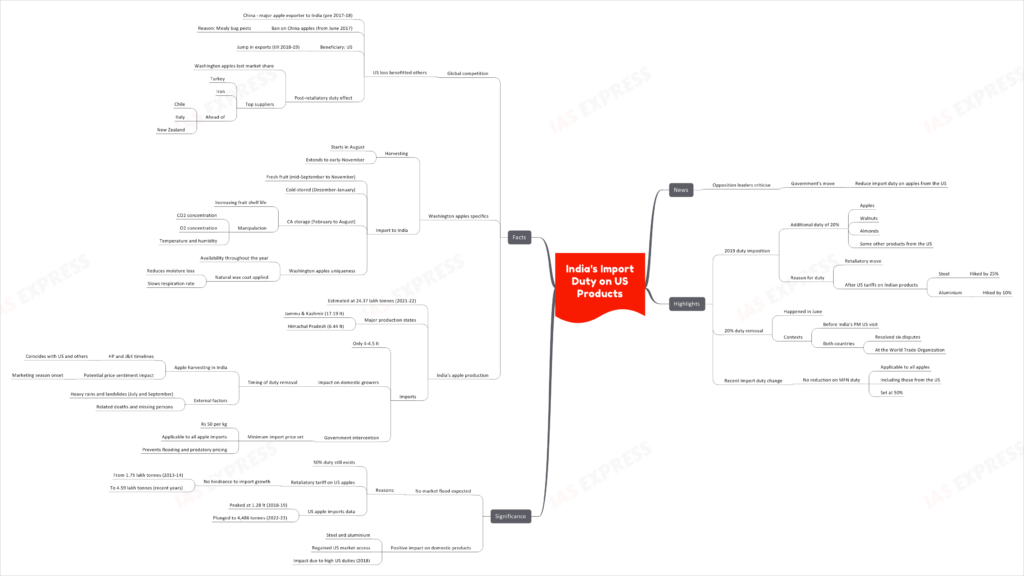India’s Import Duty on US Products

In recent news, the Indian government’s decision to reduce import duty on apples from the United States has stirred up discussions and debates among opposition leaders and experts. This move has various implications for the Indian market, especially concerning trade relations with the US and the domestic apple industry.
This topic of “India’s Import Duty on US Products” is important from the perspective of the UPSC IAS Examination, which falls under General Studies Portion.
Opposition Leaders Criticize Government’s Move
Government’s Decision to Reduce Import Duty
The central point of contention lies in the government’s decision to lower the import duty on apples imported from the US. This decision has faced criticism from opposition leaders, and it has raised several questions about its implications on the Indian economy and trade dynamics.
Highlights
2019 Duty Imposition
Additional Duty of 20%
In 2019, India imposed an additional duty of 20% on various products imported from the US, including apples, walnuts, almonds, and more. This move was seen as a retaliatory response to the US tariffs on Indian products, such as steel (hiked by 25%) and aluminum (hiked by 10%).
20% Duty Removal
The reduction of the 20% duty on US apples occurred in June. This decision was made in the context of India’s Prime Minister’s visit to the US, during which both countries resolved six disputes at the World Trade Organization.
Recent Import Duty Change
It’s essential to note that while the 20% duty was removed, there was no reduction in the Most Favored Nation (MFN) duty, which applies to all apples, including those from the US. The MFN duty remains set at 50%.
Significance
No Market Flood Expected
Reasons for Limited Impact
Despite the reduction in import duty, experts predict that the Indian market won’t be flooded with US apples for several reasons. Firstly, the 50% MFN duty still exists, acting as a significant deterrent. Additionally, retaliatory tariffs on US apples have not hindered import growth, which has risen from 1.75 lakh tonnes (2013-14) to 4.59 lakh tonnes in recent years. Import data shows that US apple imports peaked at 1.28 lakh tonnes in 2018-19 but plunged to 4,486 tonnes in 2022-23.
Positive Impact on Domestic Products
The reduction in duty has positive implications for domestic products, particularly steel and aluminum. These industries have regained access to the US market, which was impacted by high US duties imposed in 2018.
Facts
Global Competition
US Loss Benefitted Others
The US’s loss in the Indian apple market has benefited other countries. China, a major apple exporter to India before 2017-18, faced a ban on its apples due to Mealy bug pests in June 2017. This ban opened up opportunities for the US, resulting in a jump in exports until 2018-19. However, post-retaliatory duties, Washington apples lost market share to top suppliers like Turkey, Iran, Chile, Italy, and New Zealand.
Washington Apples Specifics
Harvesting and Import
Washington apples have a unique harvesting and import cycle. Harvesting starts in August and extends to early November. Import to India occurs in various forms: fresh fruit (mid-September to November), cold-stored (December to January), and CA storage (February to August). CA storage involves manipulating CO2 concentration, O2 concentration, temperature, and humidity, increasing the fruit’s shelf life. The uniqueness of Washington apples lies in their availability throughout the year, thanks to a natural wax coat that reduces moisture loss and slows the respiration rate.
India’s Apple Production
India’s apple production was estimated at 24.37 lakh tonnes in 2021-22, with major production states being Jammu & Kashmir (17.19 lakh tonnes) and Himachal Pradesh (6.44 lakh tonnes). Despite this, India imports only 4-4.5 lakh tonnes of apples, which raises questions about the impact on domestic growers.
Government Intervention
To safeguard domestic growers, the government has set a minimum import price of Rs 50 per kg, applicable to all apple imports. This measure prevents flooding the market and predatory pricing, ensuring that local farmers are not adversely affected.

